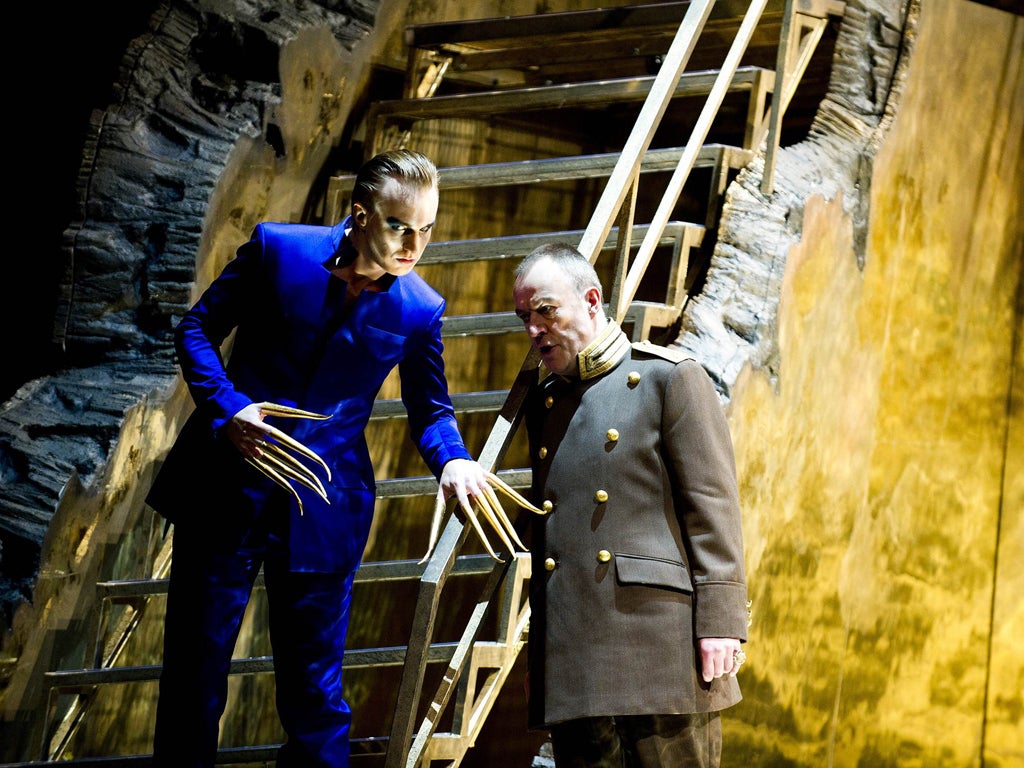Giulio Cesare, Grand Theatre, Leeds Prokofiev: Man of the People? Royal Festival Hall, London
This serious, simple production of Handel's opera is strong on storytelling and character, but suffers from musical hiccups

After the Carry On Bollywood razzmatazz of David McVicar's production at Glyndebourne, Tim Albery's Opera North staging of Giulio Cesare is startling in its seriousness and simplicity. A single structure dominates Leslie Travers's high-walled set, like an amphibious landing craft in its rough, grey exterior, a tomb of gold and a labyrinth of connecting passages concealed within. Egypt is under military occupation.
Gilded with horns, perfumed with harp, viola da gamba and muted violins, Handel's 1724 opera has more to offer than an erotic dance between two superstars of ancient history. Here is war, the madness of bereavement, the mutual ignorance of two cultures, and the swoon and buckle of love at first sight. As the heavy swirl of the overture erupts into a biting fugue, we see Pompey's murder at the hands of Tolomeo (James Laing). A giggling sociopath in an electric blue silk suit, he is the polar opposite of Pamela Helen Stephen's austere, weary Cesare.
Albery's Romans are conservative, formal, stiff. Cornelia (Ann Taylor) wears the skirt suit of a presidential candidate's wife, Sesto (Kathryn Rudge) the pristine uniform of a West Point cadet. There's a cheeky nod to contemporary orientalism when Cleopatra (Sarah Tynan) exchanges her electric blue hot pants for a cheongsam, posing as the maidservant, Lydia. Sexual manipulator par excellence, her poise dissolves when she meets the invading hero. That moment is beautifully drawn, both singers reeling. Indeed, character development and storytelling are of a high quality. Musically, it is less secure.
Opera North's orchestra has adapted well to baroque style, with particularly handsome playing from the bassoons and oboes, but conductor Robert Howarth's tempi are cautious and there's a hiccupy feel to what should be a dangerous curve of beauty. Though Tynan's voice is light, her singing is agile, stylish and radiant in the long lines of "Per pietà" and "Piangero". Stephen sings with gravity and grace but is underpowered in "Va tacito". Taylor suffers most from the dragging tempi, her composure undone, like her blouse, by Laing's venal Tolomeo. He has a happier fit of voice to role, as does Rudge, who excels as his agonised, fearful assassin.
Lolling against the final "e" like a teenager at a bus stop, the question mark in the title of the LPO's series Prokofiev: Man of the People? is an interesting touch. Think of Prokofiev's most famous music and it's all exclamation marks, brittle and dazzling. Born nine years later than Stravinsky and 15 years earlier than Shostakovich, Prokofiev seemed to suffer from middle-child syndrome, fleeing Mother Russia for Uncle Sam, and Uncle Sam for Uncle Joe, for ever competing with his siblings. This is one view that conductor Vladimir Jurowski seeks to challenge, focusing on works that reveal "a vulnerable soul" behind the state-approved sentimentality and bombast. So why open with Lieutenant Kijé?
Conducted by Alexander Vedernikov, this wide-screen pageant of sleigh bells, balalaikas, tipsy waltzes and fat-bottomed doynas did little to advance Jurowski's argument. The back-desk violinists looked bored and so, I imagine, did I. No room for boredom in the Cello Concerto, the demands of which warped Danjulo Ishizaka's normally impeccable intonation. Only in the stertorous Seventh Symphony was any vulnerability in evidence beneath the gleaming washes of colour.
In the second concert, broadcast live on Radio 3 with Jurowski at the helm and Steven Osborne at the piano, there was more engagement in the playing: a twinge of unease behind the glassy glamour of the Symphonic Song, a spark of candour in the Fifth Piano Concerto, and a sour seam of regret in the anthemic ambitions of the Sixth Symphony. Was it enough to merit that question mark? Not quite.
'Giulio Cesare' (0844 848 2720) to 16 Feb, then touring. 'Prokofiev: Man of the People?': (0844 847 9920) to 1 Feb
Next Week
Anna Picard is all ears as the Kronos Quartet's London residency opens with George Crumb's Black Angels at the Hackney Empire
Classical Choice
Kirill Karabits conducts Gautier Capuçon and the Bournemouth Symphony Orchestra in Dvorák's Cello Concerto, the overture to Weber's Oberon and Sibelius's Fifth Symphony at the Lighthouse, Poole (Wed). The Kronos Quartet's Awakenings continues with a Barbican performance of Michael Gordon's A Sad Park (Thu), and an evening of Glass, Ives, Webern, Lutoslawski and Bob Dylan at Wilton's Music Hall (Fri).
Subscribe to Independent Premium to bookmark this article
Want to bookmark your favourite articles and stories to read or reference later? Start your Independent Premium subscription today.

Join our commenting forum
Join thought-provoking conversations, follow other Independent readers and see their replies